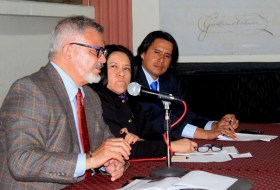News
Unicauca, fosters spaces to address post-conflict participation mechanisms
In the Francisco José de Caldas Paraninfo of the University of Cauca, participatory Mechanisms for Participation in the Postconflict Framework conference was held on Monday, 4th of September. Activity organized by the Alma Mater, the National Civil Registry Office and the CEDAE organization.
The event, attended by teachers, students, human rights defenders, social leaders, social scientists, and the community in general, was created as a space to generate concerns about the possibilities of participation that citizens have available in Colombia, since the 1991 Constitution, thinking about the exercise of control of political power, and how it has evolved.
"It was also sought to reflect on how citizen participation may or may not be an institutional instrument in the face of the Havana peace accords," said Carlos Antonio Coronel Hernández, National Delegate Registrar for Electoral Affairs, a lawyer who graduated from the University of the Cauca.
He also indicated that this participation horizon must be seen from two perspectives. On the one hand he cited the FARC transition into a movement that opened up institutional spaces with democracy to aspire to political positions, as a clear example of how the community can participate through the voting exercise.
Likewise, he referred to citizen participation not only from the exercise of the right to vote but also "how the institution creates other spaces to strengthen the same democratic system through mechanisms of citizen participation enshrined in Article 40, such as the plebiscite, the referendum, the open council and the revocation of the mandate ".
Patricia Muñoz, professor and researcher in political participation and from the Javeriana University, pointed out that the challenges that society must face in this area "are enormous", since "they open an interesting field of opportunity for citizens to take a direct part and become involved with greater frequency and effectiveness in mainstream decisions, and that they understand once the participation of the citizens enriches the process of decision and implementation in public policies.
Finally, the initiative of the National Registry of Civil Status to lead these processes "goes hand in hand with what we believe in the academy that must be done; that it will not be possible to implement the Peace Accord, nor to strengthen participatory democracy, if we do not reach the regions."
More information
Faculty of Law, Political and Social Sciences
Phone: 8209900 Ext. 1202
E-mail: derecho@unicauca.edu.co


